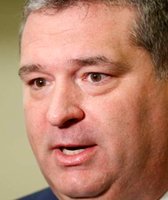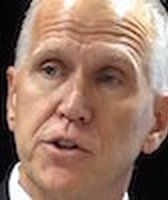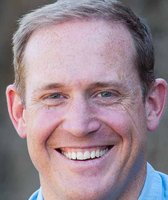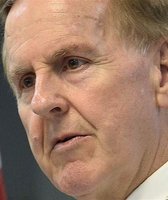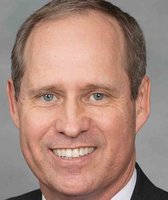Stand up for the facts!
Our only agenda is to publish the truth so you can be an informed participant in democracy.
We need your help.
I would like to contribute
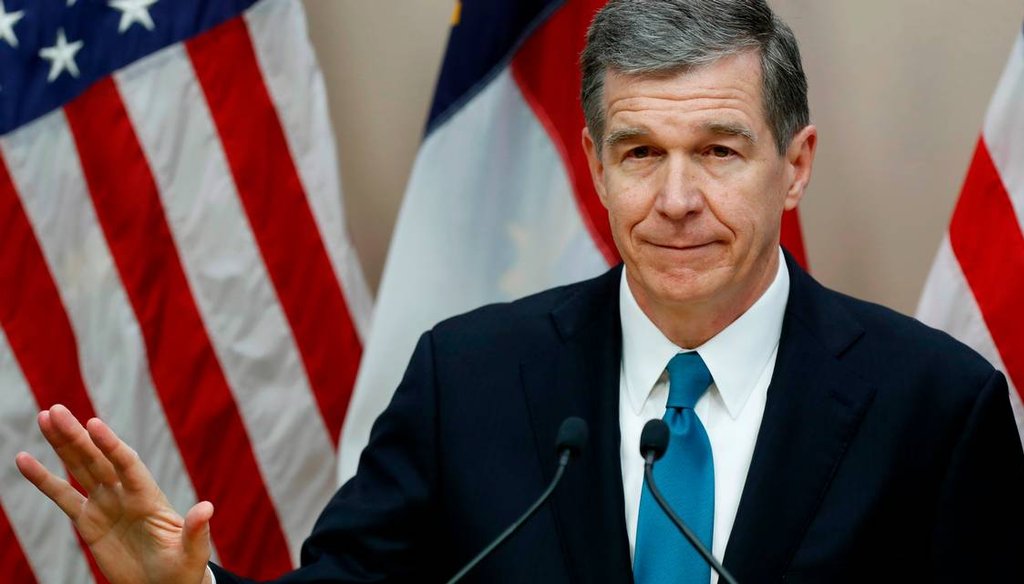
North Carolina Gov. Roy Cooper (News & Observer/Ethan Hyman)
PolitiFact North Carolina fact-checked Gov. Roy Cooper’s State of the State speech. The first-term Democratic governor called for Medicaid expansion and touted his record on jobs, the environment and curbing workplace discrimination.
One of Cooper’s main campaign promises in 2016 was to expand Medicaid, as allowed by the Affordable Care Act. He tried to go around the legislature to do so, soon after taking office, but was stopped in court. Since then he has repeatedly called on the legislature to approve the expansion, but so far to no avail.
"Rural hospitals are bordering on bankruptcy and even closing because many of their patients don’t have health insurance," Cooper said. "Are we willing to help them? It's time."
Fact check: There are a number of reasons why hospitals might close. But Cooper is certainly right that rural hospitals have been shutting down. The News & Observer reported last week that "Six rural hospitals in North Carolina have closed since 2013, including three in the last two years, according to the Sheps Center for Health Services Research at UNC-Chapel Hill."
Cooper also said that Medicaid expansion, if approved, would create "an extra 30,000 to 40,000 more good-paying jobs."
Fact check: Cooper’s political allies have said this before. PolitiFact NC previously fact-checked Rep. Darren Jackson, the top Democrat in the state House, saying it would create 40,000 jobs. That was rated "Mostly True." PolitiFact NC wrote that while it’s impossible to predict the future, "Jackson’s estimate fits in line with the available research, and experts we spoke to agreed it was reasonable."
Cooper also said that since many other states have accepted the same Medicaid expansion that North Carolina hasn’t, it means "tax dollars going to Washington to cover people in other states, but not our state."
Fact check: That’s a bit of an oversimplification, but it’s not wrong. PolitiFact previously rated Cooper as Mostly True on a similar statement. Medicaid expansion is paid for nearly entirely by the federal government, so the federal taxes paid by people here are going to fund other states’ expansion efforts, like Cooper said.
But as PolitiFact NC previously wrote, "what he doesn’t mention is that the state government currently pays nothing into the program but would have to pay hundreds of millions of dollars per year if it did accept the expansion. Doing so would also increase the federal tax burden on people all over the country, including in North Carolina."
Cooper wasted no time mentioning House Bill 2, the controversial law passed in 2016 that required transgender people in government buildings to use the bathroom corresponding with their birth certificate. He noted that the NBA All-Star Game took place in Charlotte this year after the NBA canceled a previous All-Star Game in Charlotte due to HB2.
Monday night, Cooper said: "When I took office, House Bill 2 was hurting North Carolinians and holding our economy back. Two years ago, I stood before you and said we must repeal it. And with bipartisan support, HB2 is gone."
Fact check: It’s not entirely gone. Cooper promised to "repeal HB2 and restore the worker protections that were taken away by Governor McCrory," and PolitiFact NC has rated the status of that promise a "Compromise."
Cooper and legislative leaders worked to write a bill that repealed the bathroom-related parts of HB2, but it kept in place temporarily the restrictions HB2 had on cities passing their own local rules about raising the minimum wage, adding anti-discrimination rules to help LGBT people or other of the worker protections Cooper mentioned.
Cooper also said, "I’ve signed two executive orders that reaffirm those values by banning workplace discrimination."
Fact check: He has. However, executive orders only apply to state government and state employees, not private businesses. Cooper has signed multiple executive orders, including ones to protect pregnant state employees and to protect state employees from discrimination based on gender identity, sexual orientation, or veteran status, none of which are protected by state law at large.
Cooper talked about the victims of Hurricane Florence, which resulted in 43 storm-related deaths. The hurricane flooded Eastern North Carolina in September and resulted in more than 5,200 water rescues, he noted.
For all the News & Observer’s coverage related to the storm and its aftermath, visit newsobserver.com/topics/florence.
The state and federal governments have approved more than $1 billion in aid to hurricane victims, Cooper said — that’s true — and he hopes to secure more. Those aid funds were made possible in part by the Republican-led legislature’s push in recent years to build its "rainy day fund." The state had about $2 billion in its fund before Florence hit.
Cooper warned that "climate change is making storms and more fierce." PolitiFact reported in 2017 that the evidence isn’t yet conclusive, but some research has shown that "the frequency of hurricanes is decreasing, while the intensity increases." Cooper mentioned an executive order he signed last fall, which aims to cut greenhouse gas emissions by 40 percent by 2025.
In addition to pushing for action on climate change, Cooper also spoke about what his administration’s Department of Environmental Quality has done for the environment.
"We’ve protected our clean air and water by punishing polluters and stopping emerging contaminants from being discharged into the Cape Fear River," Cooper said, a reference to the GenX pollution scandal at the Chemours plant near Fayetteville.
Fact check: Cooper’s administration did punish Chemours for dumping GenX into the river that provides much of southeastern North Carolina’s drinking water. DEQ forced it to stop discharging pollutants into the river, and also sued the company and later fined it $13 million. Chemours and its parent company, DuPont, also face a class action lawsuit filed by North Carolinians who believe their pollution made them sick.
On the campaign trail in 2016, Cooper made several promises related to education. At the time, he said that school funding had fallen behind pre-recession levels from nearly a decade prior. PolitiFact NC ruled that Mostly True, since it’s accurate if you account for inflation.
Among Cooper’s promises was a vow to bring the state’s average teacher pay to the national average. PolitiFact considers that promise to be "In The Works." North Carolina is ranked 37th in teacher pay nationwide, Cooper said Monday night. The National Education Associationranked North Carolina 37th in 2018.
Cooper said: "We’ve worked together to expand Pre-K to thousands more students, but we shouldn’t stop until every child has it." Cooper is right that he and the legislature have worked together to add thousands of children to NC Pre-K classrooms by increasing funding to cut the waiting list.
Cooper said, "Last year, I pushed for an effort to provide tuition-free community college for high-demand jobs."
Fact check: That’s true. Cooper did push for a tuition-free community college program, which was a campaign promise he made in 2016. That promise is rated "Stalled" on PolitiFact’s Coop-O-Meter, which tracks Cooper’s promises, because the legislature declined to go along with his plan.
Senate leader Phil Berger, for his part, said education will remain a priority for Republicans.
Berger said, "Teachers have received pay raises for five consecutive years."
Fact check: State Sen. Michael Lee in 2018 made a similar statement that PolitiFact rated, "Mostly True."
That progress isn’t limited to K-12 education, Berger said. He talked about a GOP-supported law that lowered tuition at three state universities.
"At three North Carolina public universities – Elizabeth City State University, UNC Pembroke, and Western Carolina University — tuition is just $500 per semester," Berger said.
That’s true.
Berger argued that the public supports the Republican agenda, but that activist judges are stopping the will of the people.
A Wake County judge last week threw out two constitutional amendments — one that implemented voter ID, another that capped the income tax — on the basis that they were placed on the ballot last year by a legislature elected under gerrymandered districts.
"Two million North Carolinians ... voted to add voter ID to the state constitution," Berger said.
Fact check: That stat is true. More than 55 percent of voters supported the idea of voter ID.
Berger also said, "That Democratic judge ruled that the entire Republican state legislature was unconstitutional for more than one-and-a-half years."
Fact check: People who hear that might think the judge’s ruling applies to everything the legislature has done in that time period. That’s not the case.
The ruling specifically said it only applied to the constitutional amendments, since those require a higher percentage of votes to pass the legislature to be put on the ballot. The judge ruled that he was overturning the amendments because they never legally should have been on the ballot in the first place.
"An illegally constituted General Assembly does not represent the people of North Carolina and is therefore not empowered to pass legislation that would amend the state’s constitution," he wrote.
Our Sources
See links in story.














